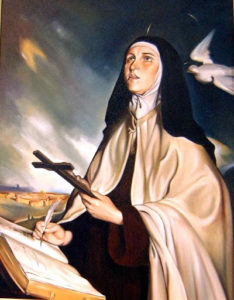 by Fr. Steve Baumann.
by Fr. Steve Baumann.
St. Teresa of Jesus (of Avila) (1515-1582) is one of the most down to earth spiritual writers that the Church has ever known. She was described as “intelligent, hardheaded, charming, and deeply spiritual.” She was wise, yet practical; intelligent, yet much in tune with her lived experience, and an energetic reformer of her Carmelite Order.
Church Historian Leonard Foley (v.2, pp114-115) in his Saint of the Day, said that the “mark she left on the Church and the world was threefold: she was a woman; she was a contemplative; she was an active reformer.
Born at Avila on March 28, 1515, Teresa was later educated by the Augustinian nuns. However, she had to leave that convent because of ill health. Recovering a few years later she entered the Carmelite Convent at Avila, but left two years later again because of illness, and returned in 1540.
As a woman, Teresa stood on her own two feet, even in the man’s world of her time. She entered the Carmelites despite the strong opposition of her father.
Teresa lived in an age of exploration as well as political, social, and religious upheaval. It was the sixteenth century, an age of turmoil and reform. Her life spanned the Protestant Reformation and the Council of Trent – from which came the Latin (Tridentine) Mass used by the Church for four hundred years until the Second Vatican Council ended in 1965.
Teresa was a woman for God, a person of prayer, discipline, and compassion. Her heart belonged to God, and her ongoing conversion was an arduous, life-long struggle, involving much suffering.
Teresa knew well the continued presence and value of suffering (physical illness, opposition to reform in her Carmelite Order, difficulties concentrating in prayer), but she accepted all of it with surrender and even some desire: “Lord, either to suffer for you, or to die.”
In 1562, she founded her first convent of reformed Carmelites, nuns who wished a more cloistered and contemplative life, rather than the more relaxed observance of monasticism common in her time. She went on to found sixteen more Carmelite convents, as she travelled through Spain. At the time she founded her second convent, she met a young Carmelite monk, St. John of the Cross, and with him founded her first monastery for men. Her years of reform and renewal were turbulent years of struggle, but Teresa was equal to the task.
Teresa’s letters and writings are spiritual classics, including her autobiography. Other major writings are The Way of Perfection, 1573; and The Interior Castle, 1577. If you want proof that a mystic (one who has a deep communion with God, often face to face) can be practical, read her writings.
For Teresa, action must begin with prayer and be nourished by contemplation in union with the redeeming Christ (mysticism). She taught that mental prayer is the best means of making oneself available and useful to the Church, and to all in the Church. In one of her shorter treatises, The Book of Life, she wrote: “Whenever we think of Christ we should recall the love that led him to bestow on us so many graces and favors, and also the great love God the Father showed in giving us his Son as a pledge of his love. Love calls for love in return. So let us strive to keep this always before our eyes and to rouse ourselves to love him. For if at some time the Lord should grant us the grace of impressing his love on our hearts, all will become easy for us and we shall accomplish great things quickly and without effort.”
Ours is also a time of turmoil, a time for reform, and a time for liberation in many parts of the world. Modern women have in Teresa a challenging example of dedication to personal prayer coupled with service to and reform for others. She is certainly a woman to admire and to imitate. Toward the end of her life, Teresa exclaimed: “Oh my Lord! How true it is that whoever works for you is paid in troubles! And what a precious price to those who love you if we understand its value.”
In 1970 Pope Saint Paul VI declared her a Doctor (teacher) of the Church. It was a recognition of what the Church long knew, that God by his Spirit “raised up St. Teresa of Jesus to show his Church the way to perfection.” So we pray that “her inspired teaching might awaken in us a longing for true holiness.”
